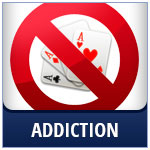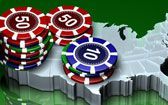 Gambling addiction, also referred to as compulsive gambling, is a disorder of impulse-control. People that are afflicted with a gambling addiction cannot control their impulse to gamble, even if they know their behavior is hurting themselves and the ones they love. Gambling addicts are constantly thinking about gambling, regardless of the consequences, their circumstances, or their own mood. Even when facing the most statistically unlikely odds to win, those suffering from a gambling addition cannot stop themselves having a bet.
Gambling addiction, also referred to as compulsive gambling, is a disorder of impulse-control. People that are afflicted with a gambling addiction cannot control their impulse to gamble, even if they know their behavior is hurting themselves and the ones they love. Gambling addicts are constantly thinking about gambling, regardless of the consequences, their circumstances, or their own mood. Even when facing the most statistically unlikely odds to win, those suffering from a gambling addition cannot stop themselves having a bet.
There are some people, however, that are not compulsive gamblers but do fit the characteristics of a problem gambler. These types of individuals allow gambling to disrupt their lives and they often chase losses or increasingly allow gambling to take over their lives.
Recognizing a Problem
Because there are no obvious physical signs, gambling addiction is often referred to as a hidden illness. Problem gamblers will often deny they have a problem when confronted about it. Because of this, it's often hard to see signs of a gambling problem or addiction.
Here are some signs that you can ask yourself to find out if you might have a gambling problem:
- Your family and friends tell you that they are worried about you.
If people close to you are telling you that they are concerned for your wellbeing, it's time to take a good hard look in the mirror. There is no shame in asking for help and talking to a friend about the road you are going down. Remember that it's never too late to make changes in life.
- You have trouble controlling your gambling activities.
If you start a gaming session, are you able to walk away if you hit your stop loss? Are you always able to get up and leave when your session is over or do you chase losses? Are you ever increasing your bets to make up losses? These are all signs of troubling behavior.
- Even if you don't have the money, you gamble anyway.
This is the most telling sign of a problem gambler quickly evolving into a gambling addict. Once you gamble away all your cash, do you head straight to the ATM machine for more? Do you start taking cash out on your credit cards, or get a payday advance to head back to the tables? This is really where your problem might be going from bad to worse and seriously affecting those you love.
- You are secretive about your gambling.
Do you lie about your whereabouts to loved ones so you can sneak away for time at the tables? This is one of the first signs that you might have a problem.
Treatment
Every person is unique and needs a recovery program specific to their needs. What might work for one problem gambler may not work for another. The biggest step in treatment is simply realizing that there is a problem. It takes a lot of courage to come to grips with this and people should know they do not have to travel the road to recovery alone. There are many others that have been down this road before and are willing to help you put your life back together. Recovery is possible if you stick with treatment and allow yourself to be a part of a support system.
Agencies That Offer Help in the United States
 The most commonly used treatment program available is Gamblers Anonymous. It's a twelve step recovery program recovery patterned after Alcoholics Anonymous.
The most commonly used treatment program available is Gamblers Anonymous. It's a twelve step recovery program recovery patterned after Alcoholics Anonymous.
Part of the twelve step program is choosing a sponsor, possibly a former gambler who has experience recovering from addiction. These sponsors play a pivotal role for guidance and support through the program.
Gamblers Anonymous has US toll free hotlines available in all 50 states. More information can be found at the official Gamblers Anonymous website.
 Gambling addiction, also referred to as compulsive gambling, is a disorder of impulse-control. People that are afflicted with a gambling addiction cannot control their impulse to gamble, even if they know their behavior is hurting themselves and the ones they love. Gambling addicts are constantly thinking about gambling, regardless of the consequences, their circumstances, or their own mood. Even when facing the most statistically unlikely odds to win, those suffering from a gambling addition cannot stop themselves having a bet.
Gambling addiction, also referred to as compulsive gambling, is a disorder of impulse-control. People that are afflicted with a gambling addiction cannot control their impulse to gamble, even if they know their behavior is hurting themselves and the ones they love. Gambling addicts are constantly thinking about gambling, regardless of the consequences, their circumstances, or their own mood. Even when facing the most statistically unlikely odds to win, those suffering from a gambling addition cannot stop themselves having a bet.
 The most commonly used treatment program available is Gamblers Anonymous. It's a twelve step recovery program recovery patterned after Alcoholics Anonymous.
The most commonly used treatment program available is Gamblers Anonymous. It's a twelve step recovery program recovery patterned after Alcoholics Anonymous.


